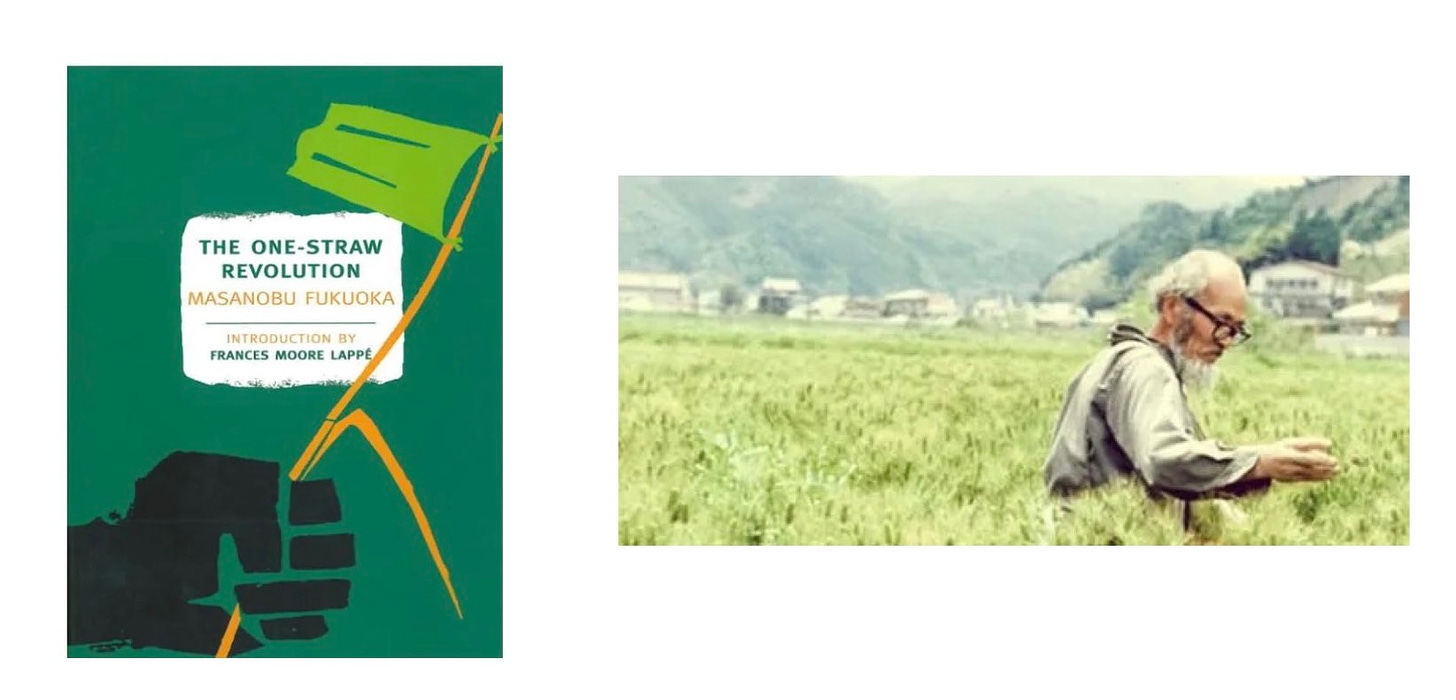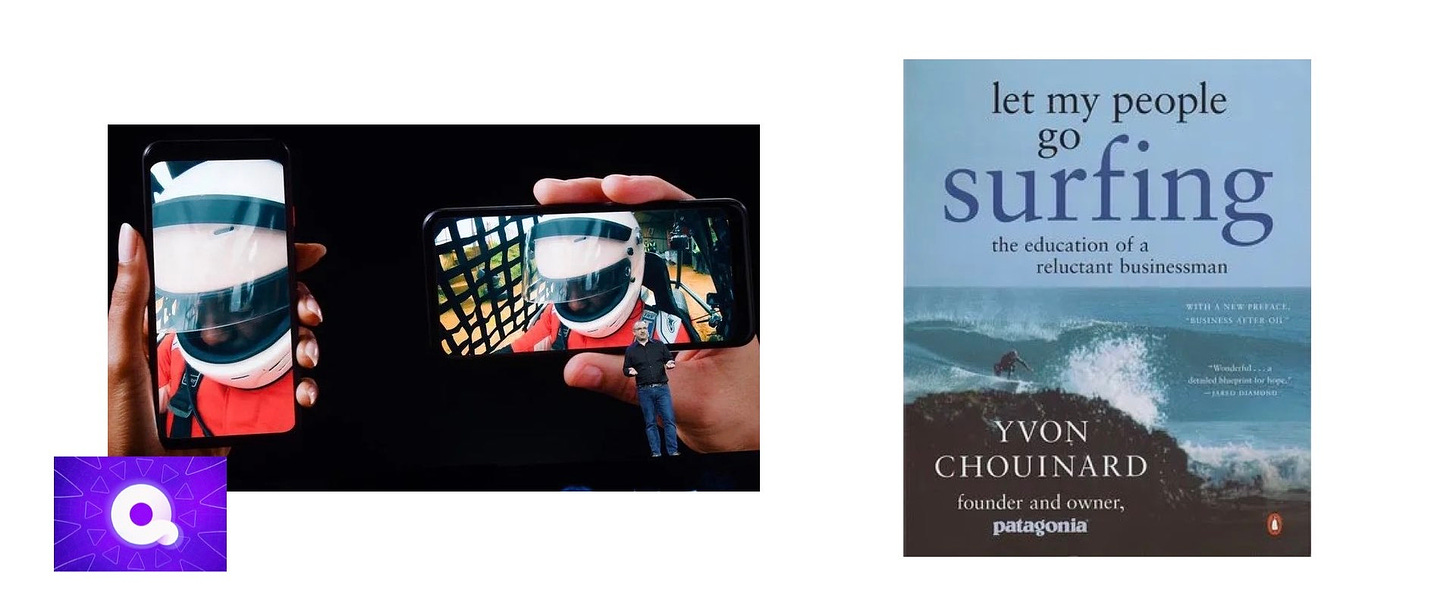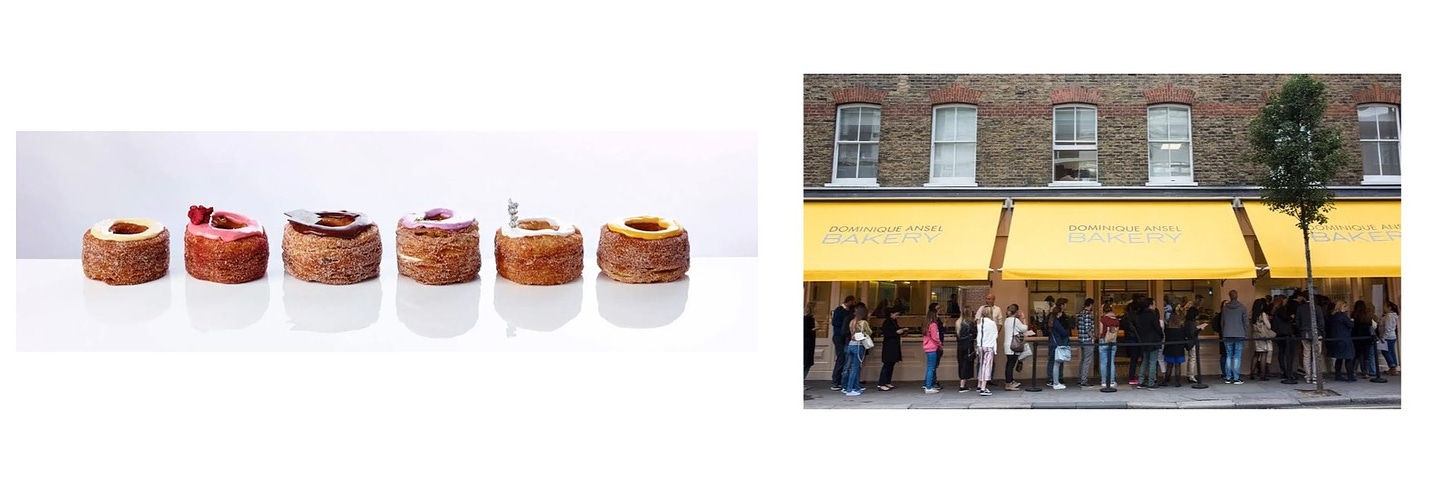Notes: Lessons from The One Straw Revolution
Business + Life Lessons from an unlikely source: The "Do Nothing Approach" from a 1970s Natural Farming Classic

Readers might be surprised to find that one of the books I most recommend to entrepreneurs—whether they helm small businesses, large companies, or bootstrapped ventures—is Masanobu Fukuoka’s 1970s manifesto on natural farming, The One-Straw Revolution. At first glance, this might seem quaint, an artifact of some bygone agrarian dream. You can almost sense the skepticism, a dismissive shrug as they glance at the cover, assuming it’s just more new-age, back-to-the-land nonsense. But within those pages lies a vision far more disruptive, more revolutionary than most of what is conveyed in the sterile world of MBA business schools.
Fukuoka’s philosophy isn’t about efficiency, metrics, or streamlined workflows. It’s about a ruthless simplicity that annihilates the bloated, parasitic structures of modernity. It’s a clear, brutal rejection of the artificial, a slash-and-burn of all the noise that suffocates real productivity. His “do-nothing” approach, paradoxical in its defiance of the cult of productivity, bureaucracy, and anti-entrepreneurial bloat, has the power to unsettle even the most rigid systems of control, offering a blueprint for entrepreneurs who dare to cut through the illusion and get to the raw, unfiltered core of business.
Imagine telling Masanobu Fukuoka that his philosophical book on upsetting farming methods in rural Japan, designed to reclaim the wild, untamed essence of the earth from the mechanical grip of modernity, could one day be applied to Silicon Valley, global financiers, and tech disruptors. He’d probably laugh, or maybe even frown, but ultimately, I think his philosophy and wisdom can improve your venture—small or large—in a more ethical, rewarding, and profitable way. Let’s discuss how.

But first, a primer on his work: Fukuoka developed a method of natural farming to reverse the slow-motion collapse of modern agriculture he was encountering in Japan, with the constant need for chemical, mechanical, and artificial inputs. He rejected machines, chemicals, even most of what we think of as "work." No plowing. No weeding. Over 50 years, his methods outperformed industrial approaches in productivity, sustainability, and labor efficiency. His book documents his “awareness,” marking a shift from complexity to simplicity. These lessons resonate deeply with what the most forward-thinking, disruptive minds in entrepreneurship understand—excess is a trap, and simplicity is an escape.
Solve Your Own Problem: The Core Directive
In the advanced economic age, endless "solutions" emerge from an HR-driven, non-entrepreneurial system rot/bloat, each adding another layer of complexity to our lives, suffocating us with new systems, new protocols, new distractions. Fukuoka’s philosophy reminds us that one can use a knife to cut through that tangle. He writes:
“Before researchers become researchers, they should become philosophers. They should consider what the human goal is, what it is that humanity should create” (Fukuoka, 73).
This is not just advice—it’s an insurgent call to arms against the status quo.
For businesses, this means rejecting the endless churn of market trends and data points. Start with a problem that gnaws at your soul, and carve your own path. The most powerful entrepreneurial energy isn’t born from following fads; it’s sparked by a deep, gnawing dissatisfaction. Like Fukuoka, whose obsession with cultivating rice in an abandoned field ignited years of radical experimentation, true innovators are relentless in their pursuit. They strip away the non-essential and get to the raw, beating core of the problem that drives them.
Consider the world blockbuster product Spanx: Sara Blakely wasn’t trying to join the pantyhose industry; she was trying to solve a personal irritation. Similarly, Airbnb didn’t start as a vision of a global travel empire; it was two guys trying to pay their rent. The key is obsession—those driven to solve their own problems often stumble upon solutions that disrupt entire industries. It’s not about following; it’s about forcing the world to bend to your will, to warp around your vision.1
This entrepreneurial drive to solve a problem usually runs parallel to a refusal to conform. Fukuoka’s obsession with solving his own problem echoes the entrepreneur's need to question, dismantle, and upend established practices. This mindset, this willingness to be radical, is not just a lesson; it’s a mandate and necessary fuel for the successful entrepreneur.
Embrace Simplicity: Slash and Burn the Noise
Fukuoka’s vision is austere, almost brutal in its simplicity. He didn’t add more; he did less, stripping away all unnecessary interventions and letting nature’s order assert itself. This isn’t just a strategy; it’s a declaration of war against the cluttered, bloated machinery of modern business. The ideal operation isn’t a convoluted monstrosity of workflows and redundancies—it’s a system that gets the job done, over and over, without a single wasted motion.
Apple, under Steve Jobs, embraced this ruthless simplicity, cutting its product line by 70% and focusing only on sleek, intuitive designs that forced the world to see things differently. In-N-Out Burger rejects the chaos of fast-food menu bloat, sticking to a sparse, focused menu. These companies embody a kind of anti-fragility, a streamlined power that Fukuoka would recognize—doing less but doing it with a precision that slices through the noise of the market.2
Quibi: A Case of Overcomplication
Where simplicity brings clarity, overcomplication breeds chaos. Quibi, the short-form streaming platform, is a stark example of how ignoring Fukuoka’s principles can lead to failure. Launched in 2020 with nearly $2 billion in funding, Quibi was supposed to revolutionize mobile entertainment. Instead, it collapsed within six months. Why? It violated the core tenets of simplicity and organic growth that Fukuoka championed.
Quibi’s content strategy was an intricate, over-engineered nightmare. It boasted a “turnstyle" feature allowing users to switch between portrait and landscape modes—an innovation without a clear user demand. Rather than simplify, Quibi added complexity without solving a real problem, making the platform feel cumbersome and unappealing. Meanwhile, its aggressive marketing and grand-scale launch attempted to force growth instead of letting the product find its natural audience.
Fukuoka’s method emphasizes patience and organic development, trusting that the right conditions will lead to natural growth. Quibi, by contrast, tried to bulldoze its way to success, bypassing the slow, iterative process that allows businesses to refine and adapt. The result was a rapid implosion—a field overburdened with artificial inputs, unable to sustain itself.

Restaurant Pop-Ups: Minimal Intervention and Organic Growth
Restaurant pop-ups are a perfect example of how Fukuoka’s philosophy can be applied to business. Like his natural farming, pop-ups leverage existing infrastructure, using minimal intervention to foster creativity, collaboration, and growth. They don’t require the heavy, upfront investments typical of traditional restaurants; instead, they utilize empty spaces, off-hours, and shared resources, reducing waste and maximizing utility.
By lowering the barriers to entry, pop-ups allow chefs and entrepreneurs to experiment freely, without the risk and pressure of launching a full-scale operation. This encourages innovation, much like Fukuoka’s fields, where crops grew within a naturally supportive ecosystem. Successful concepts can grow organically, while others can be refined or discontinued with minimal loss, fostering a natural cycle of trial, feedback, and adaptation.
Dominique Ansel Bakery is a perfect case in point. Ansel’s now-iconic Cronut pastry began as a limited release at pop-up events, which allowed him to test and refine the product before opening a flagship bakery. Similarly, Eggslut, which started as a pop-up food truck, focused on simple, high-quality egg sandwiches and grew organically, eventually expanding into multiple permanent locations worldwide. Each of these ventures embodied a kind of minimalism, using existing spaces and resources to innovate without the burden of overcommitment, driven by a passion for a differentiated product.

Pop-ups thrive on collaboration, forming symbiotic relationships with host restaurants. This mutual support reflects Fukuoka’s farming practices, where different elements of the ecosystem sustain each other. It’s not about overbuilding; it’s about using what’s already there, creating value without the waste of excess.
Trust in Natural Processes: Foster Creativity and Collaboration
Fukuoka’s “do-nothing” philosophy is rooted in a dynamic trust in nature’s raw, chaotic order. In business, this means unleashing the primal energy of creativity and collaboration, breaking down the rigid structures that stifle innovation. It means letting go, allowing teams to operate freely within a framework, trusting that their natural instincts will drive them forward. This is where businesses can tap into a kind of organic, feral productivity that no amount of planning can replicate3.
Semco Partners, a Brazilian conglomerate led by Ricardo Semler, is famous for its radical approach to employee autonomy and self-management, shattered traditional corporate non organic hierarchies. Under Semler’s leadership, the company eliminated traditional hierarchies and allowed employees to set their own schedules, choose their leaders, and decide on projects. This level of trust and empowerment led to significant improvements in productivity, innovation, and employee satisfaction. At the time of its introduction this was extremely radical. The radical decentralized management framework even led Semco to develop a leadership training program around the problem.4
Valve - Decentralized Team Drive Entrepreneurship
Valve, a video game company, is known for also its radically flat organizational structure. They don’t have traditional hierarchies or managers; instead, employees are free to choose the projects they want to work on. This level of autonomy reflects Fukuoka’s idea of trusting the natural order—in this case, the creativity and motivation of the employees.
Valve’s structure allows teams to self-organize, collaborate naturally, and innovate without the constraints of rigid top-down directives. The company believes that people perform their best work when they have control over what they do, how they do it, and who they work with. Despite the seeming lack of structure, Valve has produced several highly successful games (like Half-Life, Portal, and Dota 2), as well as the Steam platform, which revolutionized digital game distribution. The Valve New Employee Guide Book provides a glimpse into their structure and ideas.
These companies thrive because they’ve unleashed something untamed, something that doesn’t conform to the neat, orderly structure of conventional business. They’ve tapped into the natural energy of their people, and that energy is explosive linking to a style of “do-nothing” approach where Fukuoka guides but does not hamper growth of his field.
Embrace Cycles: Adaptability Through Seasons
Fukuoka’s philosophy is deeply attuned to natural cycles—the changing seasons, the ebb and flow of growth, and the periods of rest and regeneration. Businesses, too, must learn to embrace cycles: understanding when to expand, when to consolidate, when to innovate, and when to pause.
Modern business often emphasizes relentless growth, but acknowledging that there are seasons for everything allows companies to be more resilient. For instance, Nintendo has navigated multiple downturns and industry shifts by understanding the cyclical nature of entertainment technology, launching new consoles only when truly innovative ideas emerge, rather than pushing for constant updates. Embracing cycles means businesses can adapt to changing market conditions without burning out, allowing for sustainable, long-term success.
Long-Term Vision Over Short-Term Gains
Fukuoka’s methods are a rejection of the quick fix, a refusal to sacrifice long-term health for short-term profits. This mindset is a direct affront to the standard operating procedures of corporate capitalism, which devours everything in its path. Companies like Patagonia have carved out a space in this chaos by investing in long-term sustainability, even when it cuts into profits.
Fukusaya, the 400-year-old Japanese castella maker based in Nagasaki, Japan, has preserved its legacy by resisting the temptation to expand recklessly or cut corners, staying true to its core of prioritizing quality. Fukusaya has ensured that the brand remains synonymous with authentic, high-quality castella, a Japanese sponge cake that has delighted generations. Comparing Fukusaya to Quibi, one can easily see who mirrors the lessons from the One-Straw Revolution—Fukusaya has generated hundreds of millions in revenue over its private lifetime.

These companies see beyond the immediate; they play the long game. They don’t fall for the seductive pull of rapid growth, of quick returns. They build something real, something lasting, and they’re willing to sacrifice the immediate to do it. This is Fukuoka’s vision applied to business, and it’s rare, but it’s powerful.
Cultivate Humility and Openness: Continuous Learning
Fukuoka emphasized the limits of human knowledge and the need to approach the world with humility. For entrepreneurs, this is an invitation to dismantle the arrogance that pervades modern business. Recognize the gaps in your understanding, be willing to learn, and stay open to what’s out there, even if it contradicts your initial assumptions. This is where real, disruptive innovation happens—not in the comfort of what you know, but in the uneasy, chaotic space where you admit what you don’t.
IDEO, the design consultancy, has built an empire on this5. Their design thinking approach is not about knowing the answer; it’s about asking the right questions, observing, and iterating.
Verve Coffee Roasters from Santa Cruz thrives by listening, learning, and building deep, trust-based relationships with farmers, customers, and partners across its entire vertical system. These companies know that real strength comes from adaptability, from a willingness to be porous, to absorb the unexpected and transform it into something new.
Even alternative ventures like the Park Slope Food Co-op highlight this principle. They operate on a decentralized, collaborative model that invites feedback, encourages open dialogue, and adapts to the needs of the community. It’s not rigid; it’s fluid, and that fluidity is where the strength lies.
Do Less, Be More: A Final Insurgency
Fukuoka’s philosophy isn’t just a farming method; it’s an act of rebellion against the idea that more is always better. It’s a direct challenge to the bloated, over-engineered world of modernity, a demand that we step back, simplify, and cultivate something raw, something real. There are many other lessons to explore—from crop rotation as a metaphor for business expansion to questioning and rejecting conventional wisdom as a way to be flexible in rapidly disrupted markets. The above are just some of the lessons entrepreneurs can learn from Fukuoka—if they are willing to strip away the layers of artifice, to simplify, and to focus on the raw essentials of business, life, and venture.
Embrace the radical simplicity that Fukuoka championed. Cut through the noise, trust in natural processes, and build a venture that thrives not through artificial growth but through a fundamental, organic connection to your core mission. It’s a future Fukuoka envisioned, and one that is still, radically, disruptively, within reach for those who pick up a copy and sit with its lessons from The One-Straw Revolution.
“The ultimate goal of farming is not the growing of crops, but the cultivation and perfection of human beings.” - Masunobu Fukuoka
- In my own experience, my most successful venture arose from a technical problem that I needed to solve. That problem expanded into a search for a solution, one that didn’t exist. Like Fukuoka, I became obsessive in solving it. When I finally did, the solution naturally became a product. With a solution in hand, the natural entrepreneurial energy captured within it led to market success. Conversely, my other business failures, and the failures I have seen in other entrepreneurs, usually arose from not having a core entrepreneurial obsession with finding a solution to a problem. Following trends or the direction of others in a market often feels hollow, leading to weak solutions and a trailing position.
- See Ken Segall’s Insanely Simple: The Obsession That Drives Apple’s Success for more Apple.
- In my own experience, I benefited from using factory production space during off-hours to jump-start production, avoid permitting issues, save on capital expenses, and ultimately launch faster during a bootstrap venture. I cannot recommend this practice enough. Now, I try to pay back the favor by supporting other pop-ups in ventures and encourage successful mentors to support others in similar ways.
- For a deeper dive on Semco see: https://semcostyle.com/about-us/ or Ricardo Semler’s Maverick: The Success Story Behind the World's Most Unusual Workplace
- Recommended Further Reading @ Change by Design: How Design Thinking Creates New Alternatives for Business and Society by Tim Brown, IDEO's CEO, which discusses their design thinking methodology.